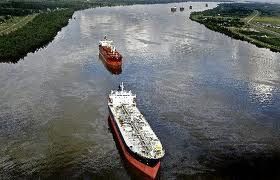
Ship pilots in the lower Mississippi River continue to raise alarm about the buildup of sediment in this vital economic artery, pointing to the recent grounding of a tanker as a sign
of the growing problem. They're joining Louisiana officials in calling for the Obama administration to provide enough money for dredging the river, preventing economic disruptions or an accident that could become an environmental disaster. The administration needs to heed these warnings and act now.
Pilots and officials blame the perfect storm of the river's flooding, which is carrying much more sediment than usual, and a large drop in the corps dredging budget, which has left the agency unable to keep up. The corps' dredging shortfall has ballooned to $95 million this year because of the river flooding, and President Obama should seek the emergency funding Louisiana officials are requesting.
The Crescent River Port Pilots' Association said insufficient dredging has led to "an irregular width and depth, causing extreme conditions, and additional navigational challenges" along the river. As an example, they noted the grounding Monday of the 800-foot-long tanker Ratna Puja. The ship was transporting carbon black oil when it ran aground roughly 10 miles south of Venice. The ship was freed two days later and no oil spilled.
Chris Accardo, chief of operations for the Army Corps of Engineers' New Orleans district, said the tanker was "way outside the navigation channel" -- the 750-foot-wide section of the river where the ship should have been traveling. Mr. Accardo said that should remove concerns as to whether inadequate dredging likely contributed to the incident.
The Coast Guard is still investigating the incident, however. And the river pilots argued the tanker's grounding shows how the vessel's navigational options as they travel up and down the river are narrowing because of the sediment buildup.
After the Ratna Puja incident, U.S. Rep. Cedric Richmond compared the situation on the Mississippi to "reducing an interstate to a single lane and imposing size restrictions on vehicles because the roads were not maintained."
The corps normally dredges to a depth of 45 feet in most parts of the river. But pilots last week began enforcing a draft restriction of 43 feet, the first time in 13 years that the allowed draft dropped to that level. That forces ships to carry less cargo, or to unload to smaller ships before passing through the channel -- options that increase costs for businesses in our region and in numerous states that rely on the Mississippi River.
Things can get much worse if the federal government doesn't provide more dredging money soon.
Michael Lorino, president of the Associated Branch Pilots, said that without additional dredging, the draft restriction could drop to 38 feet later this summer. Gary LaGrange, president and CEO of the Port of New Orleans, said those restrictions cost shipping companies a per-ship average of $1 million for each foot reduction in the allowed draft.
That illustrates why spending on appropriate dredging is a good and necessary economic investment.
U.S. Rep. Steve Scalise has noted that President Obama, in his State of the Union address this year, set a goal of doubling U.S. exports by the time the Panama Canal's widening is complete in 2014. But as Rep. Scalise said, "You can't double your exports when you're losing your capacity to dredge."
The administration should not wait for a major accident along the Mississippi River to restore dredging to its necessary levels.
Source:nola.com
We use cookies to improve your experience. By continuing to use our site, you accept our Cookies, Privacy Policy,Terms and Conditions. Close X